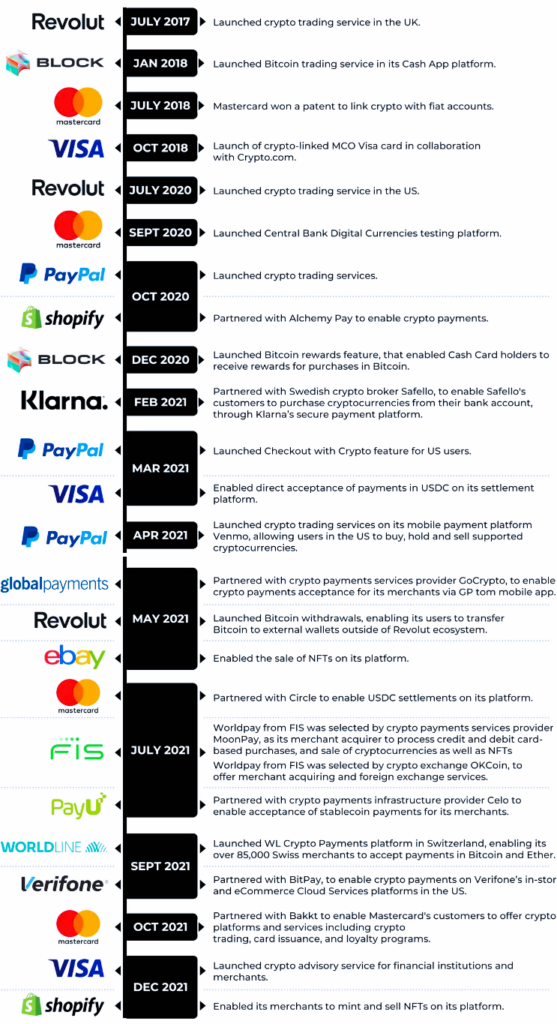The global payment landscape has changed significantly due to the increasing use of blockchain technology.. Increased demand for more efficient payment systems has led cryptocurrency to enter various payment sectors, including remittances, payment cards, and e-commerce. More and more retailers are accepting cryptocurrencies due to their shorter settlement cycles, lower acceptance costs, and increased consumer adoption. Traditional e-commerce and payment companies are venturing into the cryptocurrency payments space to offer a secure and seamless payment solution to consumers and businesses.
In this report, We examine how these traditional companies are embracing crypto payments, how they have launched their own crypto payment services, and their partnerships with crypto payment infrastructure providers..
Why are traditional payment companies and e-commerce platforms integrating cryptocurrencies?
Today, traditional methods such as cash, bank transfers, and payment cards dominate the payment landscape. According to Visa, $2002 billion worth of cryptocurrency transactions were made through the Visa network in the first quarter of 2.500, up from $1.000 billion in the first quarter of 2001.
Crypto payments enable streamlined borderless payments by eliminating intermediaries, such as correspondent banks and clearinghouses, and the complexities of traditional payments. Traditional payment companies have been reluctant to embrace crypto. However, recent advances and the Increased demand by consumers and businesses have encouraged major payment and e-commerce companies such as Mastercard, Visa and Shopify to adopt it.
Predominantly, the high volatility of crypto is the reason why companies have been reluctant to adopt it; However, with service providers offering instant fiat settlements and the emergence of stablecoins, interest in offering crypto payment options has been increasing. Around the world, more than 15.000 companies in sectors such as gaming, tourism, food and retail accept cryptocurrencies. According to one deloitte research As of December 2021, almost 75% of retailers intend to accept crypto payments by the end of 2023.
Crypto payments offer several benefits for consumers and businesses, including the following:
- payments without borders: Crypto allows seamless international transfers and payments.
- faster settlements: Crypto payments involve fewer intermediaries, which translates to faster settlement.
- Lower costs: Crypto payments carry fees of around 1%, versus fees for traditional credit cards, which range from 1,5% to 3,5%.
- The immutable nature of crypto payments also protects merchants from chargeback fraud (consumers who fraudulently claim a refund by claiming a defective product or an unauthorized transaction).
- Target new consumer segments: Accepting crypto allows businesses to access the growing number of consumers who use it as a method of payment.
- additional income: Accepting crypto allows businesses to generate additional revenue by using their crypto to earn betting returns or loans.
Cryptographic products and services offered by traditional payment and e-commerce companies and their associated infrastructure providers.
To meet the diverse needs of cryptocurrency enthusiasts, traditional e-commerce and payment companies offer various cryptocurrency-based products, primarily in collaboration with native cryptocurrency service providers such as brokerage firms, custodians, and payment providers. Some of these products are
Negotiation and funds transfer services: With the increasing interest of consumers in digital assets, traditional payment companies such as PayPal y Revolut They offer cryptocurrency trading services and allow peer-to-peer transfers through their platforms. PayPal has partnered with the blockchain infrastructure provider Paxos and Revolut with Apex Crypto. Similarly, American payment and financial services company Block (formerly known as Square) also offers a Bitcoin trading service through its Cash App platform.
payment cards: Visa and Mastercard offer cryptocurrency-linked cards provided by partner crypto exchanges and wallet providers that cardholders can use to convert cryptocurrency to fiat and make payments. Cryptocurrency platforms that offer cryptocurrency-linked Visa cards include Coinbase, Bitpanda y WirexWhile BitPay y Nexus They offer Mastercard cards linked to cryptocurrencies. Some cards allow cardholders to earn cryptocurrency rewards.
Payment services to merchants: Traditional payment companies are allowing their merchants to receive payments in cryptocurrencies. For example, PayPal offers a cryptocurrency payment service, which allows its users to make purchases at partner online merchants using their cryptocurrency balance. The cryptocurrencies that it supports are Bitcoin, Ethereum, Litecoin and Bitcoin Cash. Similarly, payment service provider Worldline offers the WL Crypto Payments solution in collaboration with Bitcoin Switzerland, a Swiss crypto-financial service provider. It allows your offline and online merchants to accept payments in Bitcoin, Bitcoin Lightning and Ethereum.
Ecommerce service providers like Shopify, WooCommerce, and BigCommerce are collaborating with service providers to enable merchants to accept crypto payments.. Shopify, through its partnerships with Crypto.com, Coinbase Commerce, BitPay, DePay, OpenNode, and Strike, enables its merchants to accept payments in cryptocurrencies such as Bitcoin, Ethereum, Dogecoin, Bitcoin Lightning, Polygon, and Binance Smart Chain.
Payment companies also offer stablecoin settlements to avoid the complexities of converting digital assets to fiat. Both Visa and FIS payment service provider Worldpay (the latter in partnership with Circle) have enabled businesses to receive settlements in USD Coin (stablecoin).
Opportunities for traditional payment and e-commerce companies
Traditional e-commerce and payment companies have an advantage over native cryptocurrency providers as they have a large user base, robust systems, and are regulated, making them a safer option for customers. According to Paying With Cryptocurrency, as of June 2022, only 23% of businesses reported accepting cryptocurrency payments through crypto-native wallets, while most transactions are made through traditional payment business wallets. Offering crypto payment services could give traditional payment companies a competitive advantage.
Traditional payment service providers could integrate cryptocurrencies into their platforms and access the growing demand for these types of services.
Key developments (2017-2021)
The table below highlights significant cryptographic developments from some of the leading traditional payment companies and e-commerce platforms.

Promotions from January 2022 to September 2022
- The companies continued to expand their product portfolios:
In June 2022, PayPal expanded its cryptocurrency offering, allowing its US customers to move supported currencies between PayPal and external wallets or exchanges. It also removed fees for cryptocurrency transfers between PayPal users and obtained a full Bitlicense from the New York Department of Financial Services. In January 2022, the company announced plans to launch its stablecoin to complement its expanding cryptocurrency business.
In August 2022, Revolut expanded its cryptocurrency offering in the UK and the European Economic Area by launching support for 22 new tokens, allowing its clients to trade more than 80 currencies. In September, it obtained registration from the Financial Conduct Authority to offer crypto services in the UK. In August 2022, the company expanded its cryptocurrency trading services to Singapore.
- Payment network providers expanded their cryptocurrency-based services through partnerships:
Visa and Mastercard are partnering with cryptocurrency wallet providers and exchanges to offer cryptocurrency-linked cards. On October 17, 2020, Mastercard partnered with cryptocurrency trading platform Paxos to provide a program that helps financial institutions offer cryptocurrency trading.
In September 2022, Mastercard partnered with hi, a provider of cryptocurrency-based financial services, to launch a customizable non-fungible token (NFT) card. Cardholders can personalize their cards with NFT avatars and use them to spend fiat, stablecoins and other tokens at any merchant that supports Mastercard. Other Mastercard partnerships in 2022 include Nexo and Binance.
Visa partnered with Alterbank, Zro Bank in Brazil and Satoshi Tango in Argentina to launch Visa-branded linked crypto cards.
In June 2022, American Express partnered with crypto wallet provider Abra to launch its first crypto-linked card. Holders can receive returns in more than 100 cryptocurrencies supported by the Abra platform.
- Payment service providers and e-commerce platforms launched crypto payment solutions for businesses:
In September 2022, BigCommerce partnered with BitPay and CoinPayments to offer crypto payment solutions.
In May 2022, Shopify partnered with Crypto.com to offer the Crypto.com Pay feature, which allows merchants to accept payments in more than 20 tokens. In April 2022, he partnered with Stripe.
In April 2022, Stripe, a US-based payment service provider, launched a crypto payment service, which enables its partner marketplaces and platforms to make instant payments to their stakeholders.
In February 2022, eBay added crypto payments to its website. In June 2022, it acquired KnownOrigin, a leading NFT marketplace.
In December 2021, Block (formerly Square) launched a crypto donations feature, allowing users of its Cash App to make gifts of as little as $1 in Bitcoin.
In February 2022, FIS Worldpay partnered with Circle, allowing businesses to receive USDC settlements. In March 2022, it partnered with the Shyft Network to enable its merchants to comply with cryptocurrency regulations.
In June 2022, Mastercard partnered with NFT marketplaces, including Immutable X, Candy Digital, The Sandbox, Mintable, Spring, Nifty Gateway, and Web3 infrastructure provider MoonPay, to enable Mastercard cardholders to purchase NFTs directly.
The future of cryptocurrency payments looks bright
With the growing interest in digital assets and the fact that both merchants and consumers see cryptocurrencies as a viable and more efficient payment option, it is not surprising that traditional payment and e-commerce platforms are embracing cryptocurrency payments.
Crypto could create an advanced global payments ecosystem, and crypto payments present significant business opportunities for traditional e-commerce and payment service providers. The future evolution of stablecoins will further increase the speed of payments and reduce transaction costs, which is crucial for the continued adoption of crypto. Cryptocurrency payments will open new avenues for businesses to serve their customers.




